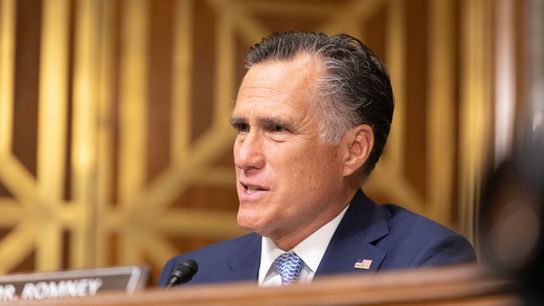In these polarized times, there are vanishingly few causes a politician can take on and expect support from both sides of the aisle. In 2019, the NCAA's business model is one of them.
Storming the NCAA's castle has been a bipartisan issue this entire year both on Capitol Hill and in statehouses across the nation, but the pitchfork brigade has gained its most high-profile torchbearer.
On Wednesday, U.S. Senator Mitt Romney voiced his support to take on the NCAA's ban on name, image and likeness payments to college athletes. While he is not the first member of Congress's upper chamber to join the effort, he is the first Republican and the most high-profile member to date as the former governor of Massachusetts and the Republican nominee for President in 2012.
Furthermore, here is Romney, frequent NCAA critic Jay Bilas and other DC politicians with Rep. Mark Walker (R-NC), the first of two Republican members of the House of Representatives to forward NCAA legislation on this topic this year.
Simply put, a high-profile Senator saying, "We're coming for you" is a nightmare scenario for the NCAA. Someone like Romney isn't in tune to the nuance of the name, image and likeness debate inside college sports and, worse, he probably doesn't care.
The company line inside College Sports, Inc., is that such an issue should be handled at a national level because 50 different states passing 50 different laws would be a migraine headache for a national organization to manage.
"You've got 50 different states with 50 different labor law rules," NCAA president Emmert said last month. "If you move into what are, in essence, labor negotiations, you have to do that state-by-state … It just falls apart in its complexity."
Emmert's not exactly wrong... but that's where his thoughts on the issue seem to end. Yes, 50 states passing 50 laws -- or, worse, 25 states passing laws and 25 states not -- is a bureaucratic nightmare for the NCAA, but Mitt Romney doesn't care. He sees a political ball he can kick through the goal posts and he's swinging away. Once this issue is dealt with, he'll move on to the next cause without regard for the cloud of smoke he leaves behind.
Yes, name, image and likeness is a complicated issue best handled on a national level. Yes, it would be best for the coaches and athletes affected by any oncoming changes for the NCAA to manage the issue and implementation, not politicians.
But the politicians aren't waiting for the NCAA, so it's incumbent upon NCAA leadership to, you know, lead.
